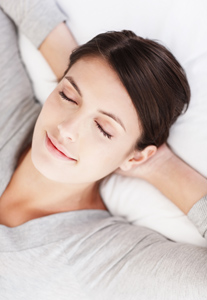
One of the greatest advantages to using Invisalign is that it provides maximum results with minimal impact on your everyday life. Invisalign is comfortable, easy to insert, and simple to remove. Because you can remove Invisalign aligners, you can enjoy all your favorite foods and beverages without worries about getting food stuck in the wires and brackets of traditional braces.
Eating and Invisalign
While the aligner is durable and strong, you should remove it before you eat or drink beverages, as the chewing action inside your mouth can break, crack, or distort the aligner. Even minute damage to the Invisalign tray will prevent it from aligning your teeth properly. Furthermore, eating with Invisalign in your mouth can be quite messy.
Beverages and Invisalign
Repeated exposure to hot liquids may also cause the Invisalign aligner to distort. This distortion changes the shape of your aligner in a way that will affect how it straightens your teeth. Contact our Manasquan office if your Invisalign aligner has distorted after consuming a hot beverage.
Fluids can settle inside the aligner to “bathe” the teeth. Bathing teeth in acidic fluids can be especially problematic, as the acids can wear away tooth enamel. Exposure to acidic fluids is not normally a problem, as saliva neutralizes and buffers the acid then washes it away. Wearing an aligner, however, prevents the saliva from doing those jobs, increasing your risk for tooth decay.
Colored drinks may also change the color of your teeth. Most discoloration is temporary but stubborn stains may occur.
To prevent discoloration and tooth decay, brush your teeth after every meal or beverage before putting in your Invisalign aligners. If you do not have access to clean water, chew sugar-free gum to remove bacteria, acid, and food particles from your teeth. As a last resort, you may leave your aligners out for an hour or two until you can brush and floss properly. Before inserting Invisalign, rinse the aligner in lukewarm water or use the Invisalign cleaning kit.
Contact our Manasquan office for more information about eating and Invisalign.

Diabetes is a chronic disease that increases the risk for many serious health problems, including severe gum disease. November is Diabetes Awareness Month, and it’s a great time for us at Squan Family Dentistry to remind our patients that the way you care for your teeth at home doesn’t just affect your oral health; keeping your mouth healthy is vital to your overall health, too.
Diabetes is the result of a deficiency, or lack of the hormone insulin to properly transport glucose (blood sugar) to the cells throughout the body. According to the American Diabetes Association, the most common types of diabetes are Type One (90-95 percent of cases), Type Two (five percent), and gestational or pregnancy diabetes. Women who have had gestational diabetes have a 35 to 60 percent chance of developing diabetes, mostly Type Two, in the ten to 20 years following their pregnancy.
In the past decade, researchers have found links between periodontal (gum) disease and diabetes. Not only are people with diabetes more vulnerable to gum disease, but diabetes may also have the potential to affect blood glucose control, as well as contribute to the advancement of diabetes.
Nearly 26 million Americans currently live with the disease, with an additional 79 million in the pre-diabetes stage. There is some good news we want you to know, however; you can protect your gums and teeth from the effects of diabetes by visiting our Manasquan office for an exam. Patients who are living with diabetes may require more often visits to ensure their dental health remains in tip-top shape. Many insurance plans provide expanded benefits for diabetic patients, and Dr. Skelian and Dr. Aptaker can tell you how often you need to come in for an appointment.
For more information on how we can help, please do not hesitate to give us a call at our Manasquan office.

All Hallows’ Eve, more commonly known as Halloween, is a yearly event celebrated on October 31, and one that is anticipated by the young and young at heart all over the world. Some scholars claim that Halloween originated from Celtic festivals that honored the dead or that celebrated the harvest, while others doubt that there’s any connection at all to Samhain (a Gaelic harvest festival.) Regardless of its origin, our team at the dental office of Dr. Skelian and Dr. Aptaker hopes that Halloween is fun and enjoyed by all of our awesome patients!
Trick or treat?
In North America, Halloween is predominantly celebrated by children who dress up in costumes, which range from scary to cute, who then go around the neighborhood knocking on doors asking “trick or treat”, and they are given candy in return. Trick-or-treating is a time honored tradition, and though many parents groan at the pounds and pounds of candy collected by youngsters and fear for the health of their teeth, there are a few things you can do to help their teeth stay in great shape until the candy is gone:
Halloween Fun
Halloween isn’t just about gorging on candy; there are other events associated with this festive day including carving jack-o’-lanterns, painting pumpkins, decorating sugar cookies, bobbing for apples, going to haunted houses, or just curling up on the couch with a bowl full of popcorn and watching some classic, scary movies.
Halloween Around the World
Some countries, like Australia, frown upon Halloween, claiming it is an American event and not based in Australian culture, while others like Italy have embraced the fun and celebrate much as Canadians and Americans do. Mexicans have been celebrating this fun day since around 1960, and it marks the beginning of the Day of the Dead festival. Some countries in Europe have come late to the party, but since the 1990s, countries like Sweden, Norway, and Germany have started celebrating Halloween as well, and finding children in costumes or having ghosts hanging in windows has become commonplace.
Halloween is about fun; stepping outside our normal lives and donning a costume or gathering with friends to knock on doors and ask for candy is as much a part of our culture as hot dogs and barbecue on Labor Day. Have a safe and happy Halloween from the team at Squan Family Dentistry!

At Squan Family Dentistry, we understand that getting high-quality sleep is vital to maintaining your overall health. Insufficient sleep can lead to an inability to concentrate, motor vehicle accidents, and difficulty performing at work. Since approximately 18 million Americans suffer from sleep apnea, this poses a significant public health problem. If you think you may have sleep apnea, talk to Dr. Skelian and Dr. Aptaker and our team about devices that can help you get a good night’s rest.
What is sleep apnea?
Sleep apnea is a relatively common disorder in which breathing stops or becomes very shallow during the night. These bouts of paused breathing may last a few seconds or as long as several minutes. When 30 or more breathing interruptions occur per hour, sleep apnea leads to dramatic reductions in sleep quality. In many cases, this condition is caused by your airway becoming blocked or collapsed during sleep.
Anyone can get sleep apnea, but there are certain factors that increase your risk. Having small airways, being overweight, being male, or having a family history of sleep apnea increases the likelihood that you will develop the disorder. If you think you have sleep apnea, visit highly encourage you to visit our Manasquan office for a thorough physical exam, comprehensive medical history, and a sleep study.
Treatment Options
Several treatment avenues are available for people with sleep apnea. One popular option is to wear an oral appliance. For example, a mandibular advancement device (MAD) looks like a sports mouthguard and slightly repositions your jaw, to keep your airway unobstructed. Another option is a tongue-retraining device (TRD), which holds your tongue in place to ensure that your airway stays open during the night.
For individuals with mild-to-moderate sleep apnea, dental devices are a smart option. Many patients enjoy improved sleep, reductions in snoring, and less fatigue during daytime hours. If you’re curious about getting an oral appliance to help with your sleep apnea, please consult our team at Squan Family Dentistry. After a consultation and examination, we can fit the type of device that works best for your condition.